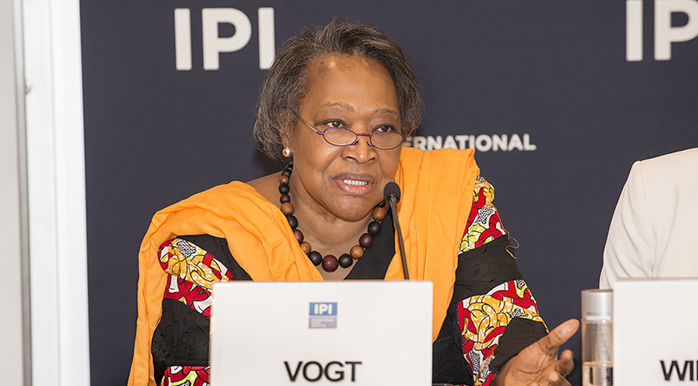
“As members of the international community, we should not come with preconceived and prefixed concepts of democracy to impose,” said Margaret Vogt, Mediator-in-Residence at the UN Department of Political Affairs. “We should make sure that we work with organic structures and institutions and reinforce those.”
Ms. Vogt was part of a panel on September 16, 2013 organized by the International Peace Institute and the United Nations Working group on Democracy to discuss the centrality to the United Nations work of promoting democratization. Although the word “democracy” famously does not appear in the UN Charter, its development has nevertheless been supported by the three successive secretaries-general as a norm. “Democracy,” Ban Ki-moon said in 2009, “based on the rule of law is ultimately a means to achieve international peace and security, economic and social progress, and development and respect for human rights”—which are the three pillars of the UN’s mission.
“In undertaking peace operations,” Edmond Mulet, Assistant Secretary-General for Peacekeeping Operations, told the audience, “the UN has learned that democracy must take root from within.” Mr. Mulet, a former Special Representative of the Secretary-General for Haiti, added an example from his experience in that country, “A peaceful transmission of power from one democratically elected government to another was a condition sine qua non to succeed in broader reconstruction and humanitarian action.”
However, the dangers of limiting the scope of democratization were echoed by several panelists at the IPI discussion. As Michael Doyle, an IPI board member and Chair of the Advisory Board of UN Democracy Fund, said, “If we define democracy just as an election, it can be extremely destabilizing in many circumstances.” He added, “[T]herefore, we have to have a much more comprehensive understating of democracy, defined locally, but that also includes building institutions, building ties across interest groups, not just designed to separate them, [but] helping them define their own norms of governance beyond the events of a single day in a voting booth.”
This task is at the core of UN efforts on the ground towards democratization and realization of the three pillars of the UN’s mission as set out in the Charter. The panelists addressed the need for Parliaments to be truly representative of the whole of the population, not merely the capital, which, when that happens, marginalizes rural peoples.
The panel also discussed issues of legitimacy, security and accountability. “Democracy is a process but fundamental to that process is the presence of certain minimums,” said Ms. Vogt, who is also a former Special Representative of the Secretary-General for the Central African Republic. “How can you stabilize a situation in a security vacuum?”
The processes are further complicated by the fact that UN representatives are not traditional political actors, as Sanaka Samarasinha, UN Development Programme Resident Representative in Belarus, noted, “you don’t have a political role but you deal with political institutions all the time.” One way to the end goal of functional democracies, noted Harriette Williams Bright, New York Representative and Advocacy Officer for Femmes Africa Solidarité, an NGO focused on empowering women in Africa, is through specific groups of the population. “Women are a strong support for change in environments in which they want to live,” she said.
“There is not a unique path towards democracy,” said Mr. Mulet, “and no final destination, either.” The means to achieve democratization, the panel seemed to concur, are neither fixed nor easy, but the ends remain clearer.
Read the Global Observatory Interview with Margaret Vogt>>
Watch event:







